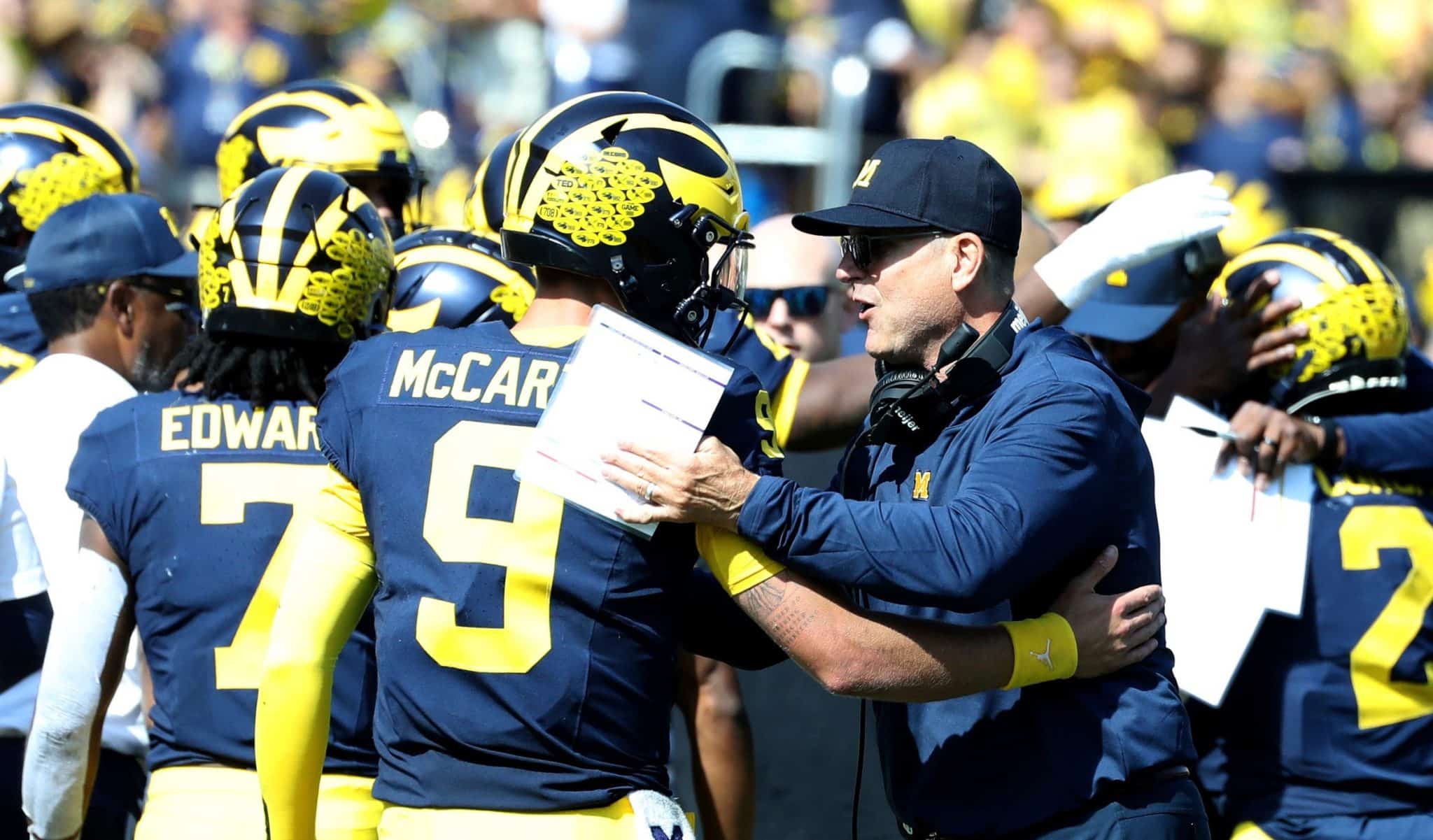
Hayes: Big Ten coach on Michigan: ‘They’ve been doing this crap for years’
By Matt Hayes
Published:
Don’t jump to conclusions just yet. There’s a long way to go with the Michigan cheating investigation, and there’s a threshold of truth and reality that has yet to be crossed.
Proving that Michigan cheated while attempting to gain a competitive advantage — because that’s what the NCAA’s sign stealing investigation is — is a heavy lift.
It’s not the ticky-tack sign stealing that every program does, or tries to do, on game day. It’s advance scouting of future opponents by use of video devices — in this case, a phone — to record signs and use it as future game preparation.
It’s an elaborate and devious conspiracy, one that includes multiple entry points of investigation that will rely on a murky connect the dots process.
I wrote last weekend that it may be next to impossible for the NCAA to prove this was happening without specific video evidence. Well, we might just have that.
Key word: might.
ESPN is reporting that “video evidence” is expected to be sent to the NCAA this week from rival Big Ten schools, detailing the sign stealing with video from stadium surveillance cameras. Those cameras allegedly found a person in the seat of a ticket purchased by Michigan staffer Connor Stalions — whom Michigan suspended with pay last weekend until the investigation is complete — holding his phone up and filming the home team’s sideline the entire game.
ESPN is also reporting that multiple sources claim Stalions bought tickets to as many as 9 games over the past 3 years through online retailers, and each followed a specific pattern: near the 45-yard line, and high enough for a clear view of the opposite sideline.
There’s a lot to unpack here, beginning with: Who pulled off the dastardly deed? Because if there’s no name, how can there be a crime?
Can the person be clearly identified by the video, and is it clear the person in the video was filming or taking photos — or taking photos and video of any number of things on game day like thousands of other fans?
Can the NCAA delve deeper in the investigation, and find season ticket holders around the person who allegedly filmed the other team’s sideline to corroborate the allegation? Is there video from other fans detailing the scheme, and can the NCAA find those fans and convince them to cooperate?
Can the NCAA build a circumstantial case so damning — ESPN is also reporting that Stalions bought and forwarded tickets to at least 3 other individuals for other games, and the ticket transfer is clear through ticket data tracking — that Stalions admits to the allegations and turns on Michigan? Does he implicate other staffers, all the way up to Harbaugh?
Or is this a wild chase brought about by petty jealousy?
“Jealousy? They’ve been doing this crap for years,” a Big Ten coach told Saturday Down South. “Stealing signals during a game is one thing. Future scouting and stealing (signals) is a whole other problem. A big problem.”
The eye of the beholder
Remember, what you see on a video isn’t what another person sees. What the NCAA sees in a case is rarely what the school in question sees.
It wasn’t long ago that the NCAA accused North Carolina of funneling student-athletes through bogus classes for more than a decade to keep them eligible. That, everyone, is the definition of “competitive advantage.”
Ultimately, the NCAA conceded it didn’t have the authority to validate the academic rigor of any class, but UNC’s scheme was blatantly immoral and made a mockery of the NCAA’s amateur model.
North Carolina said they weren’t bogus classes because — are you ready for this? — they were available to the general student population, too. Which was true. In other words, Joe and Jane Student could have taken — and many did take — the classes just as easily as any student-athlete.
Guess who won that morally bankrupt argument? Here’s a hint: It wasn’t the NCAA.
After years of investigating rampant cheating (because that’s what it was), and nailing down a systemic and unambiguous scheme to keep student-athletes eligible, the NCAA pulled away, capitulated and signed off on the North Carolina explanation. North Carolina escaped what should’ve been crippling sanctions because its attorneys were more prepared than the NCAA’s.
That investigation included academic transcripts, and hours of interviews with those running the classes and the student-athletes taking them. Not grainy video from a surveillance camera that may or may not show a person who may or may not be working for Stalions or Michigan (or both), who may or may not be recording signals from the other sideline.
This thing is a long way from over, and may never lead to anything — unless the NCAA gets a break and Stalions turns on Michigan.
Stealing scenarios, The Epilogue
Worst-case scenario for Harbaugh and Michigan: Stalions exposes the scheme.
While Harbaugh can proclaim he knew nothing of the elaborate scheme — and Stalions could even corroborate that claim — Harbaugh would still be punished under NCAA bylaw 11.1.1.
The “Head Coach Responsibility” rule states, “a head coach is presumed to be responsible for the actions of all assistant coaches and administrators who report, directly or indirectly, to the head coach.”
In other words, Harbaugh can’t use plausible deniability. He will be responsible for Stalions’ actions.
Best-case scenario: The video doesn’t show anything specific, and the NCAA can’t find corroborating witnesses.
Best-case scenario, Part II: Michigan wins the national title, and Harbaugh leaves for the NFL. In that scenario, Michigan would still likely face NCAA sanctions should the scheme be corroborated.
Matt Hayes is a national college football writer for Saturday Down South. You can hear him daily from 12-3 p.m. on 1010XL in Jacksonville. Follow on Twitter @MattHayesCFB







